
Online Open Session Doctorate Promotion of Lisa Adimata
COMPREHENSIVE MEDICATION MANAGEMENT MODEL AND THE INFLUENCE ON PATIENT
EMPOWERMENT AND TREATMENT OPTIMIZATION
(STUDY ON TYPE II DIABETES MELLITUS PATIENTS WITH REFERRAL PROGRAM
IN SURABAYA PRIMARY HEALTH CARE)
Abstract
Treatment of Type 2 Diabetes patients in the health care system in Indonesia may undergo a transition through the Referral Program (PRB) which aims to improve access and the function of drug monitoring. Comprehensive Medication Management (CMM) has been developed as a concept for pharmaceutical care in the primary health care by involving patients and collaborating with doctors to optimize drug therapy outcomes and has the opportunity to be developed in chronic disease services. The aim of this study was to implement the Comprehensive Medication Management Model (PTOK-Model) strengthened by a pharmacist-doctor collaborative practice agreement in the pharmaceutical care process in Diabetes PRB and learning its effects on patient empowerment and optimizing the treatment outcomes. The methods included the initial stage to conduct observational research on the Knowledge, Attitude, and Practice (KAP) of pharmacists and the experience of collaboration between doctors and pharmacists in PTOK. Based on the results of the initial stages, a Focus Group Discussion was carried out to formulate a collaborative practice agreement in PTOK. The next stage was an experimental study of the implementation of the PTOK-Model in Diabetes PRB patients who were classified into intervention and control groups with a total of 42 patients in 18 Public Health Centers in Surabaya. In the control group, pharmacists provided conventional pharmaceutical care that had been carried out. The PTOK-Model gave significant differences in all domains of patient empowerment, HbA1c, and the number of events of Drug Therapy Problems (MTO) in the intervention group before and after the implementation of the PTOK-Model, while in the control group, there was no significant difference. Based on the score gained by each patient's empowerment domain, HbA1c, the number of MTO events before and after the implementation of the PTOK-Model in the intervention group was significantly different from the control group. The result shows that a pharmacist’s attitude in assessing the effectiveness and safety of drug-related needs corresponds with the empowerment of patient’s experience related to indications, effectiveness, and safety of medication use. In addition, a pharmacist’s practice in monitoring and evaluating medication indications, safety, and adherence corresponds to the empowerment of patients' ability to medication use. The PTOK-Model can be implemented in Diabetes PRB by providing training to pharmacists regarding pharmacotherapy workup, and establishing a pharmacist physician collaborative practice agreement in optimizing drug therapy.
Keywords: Comprehensive Medication Management Model (PTOK-Model), Diabetes PRB, Patient Empowerment, HbA1c, DRP








